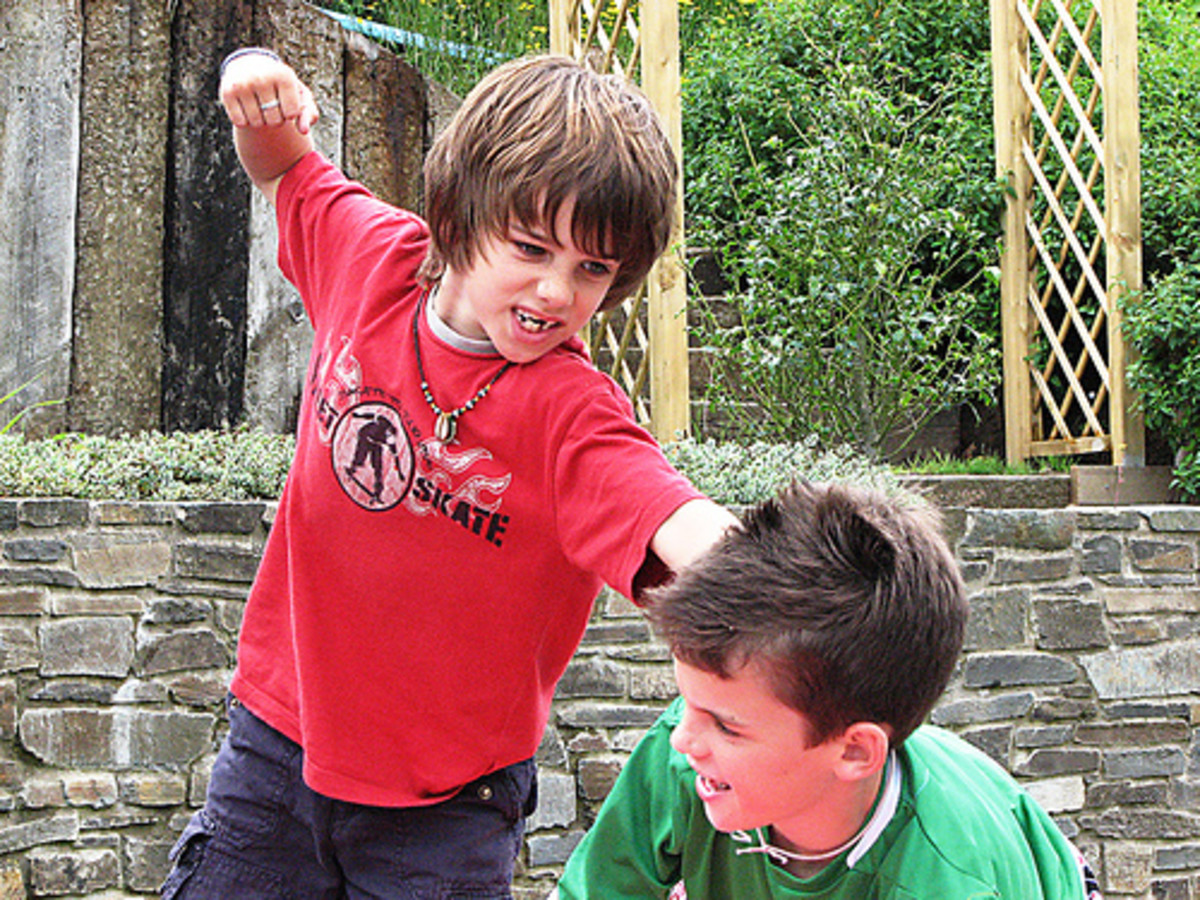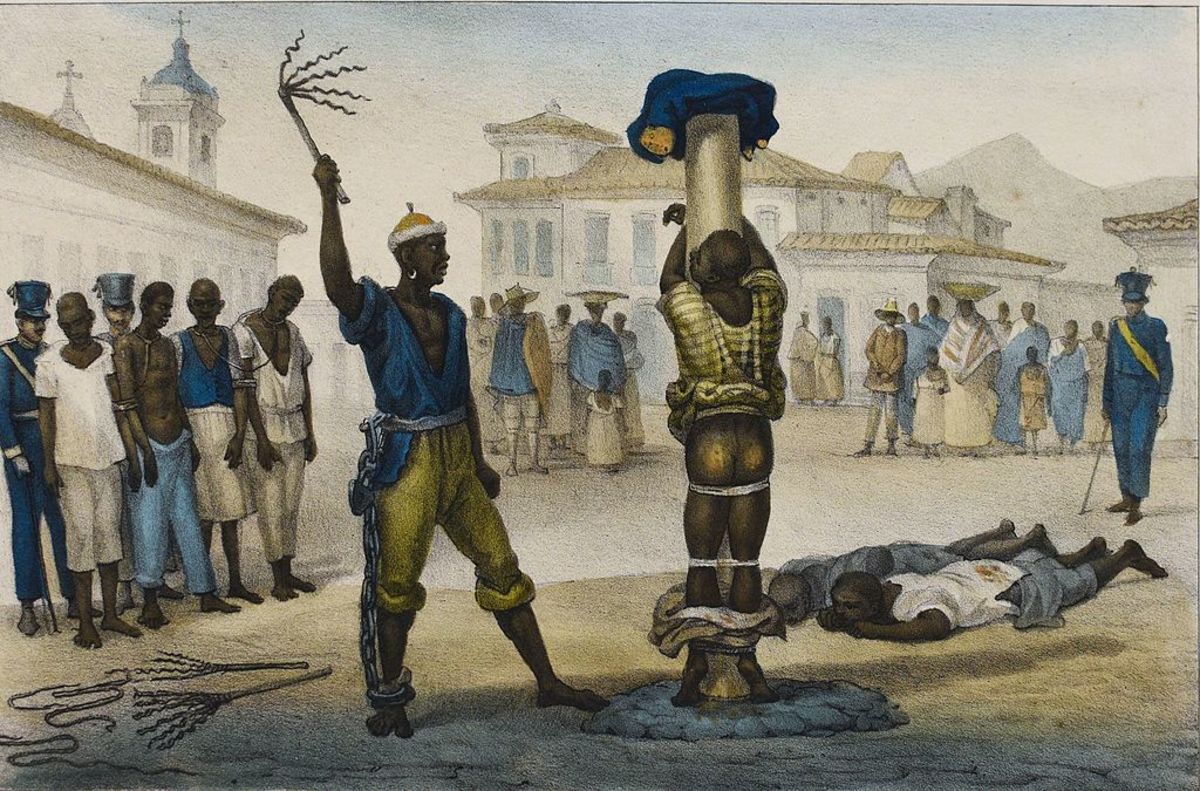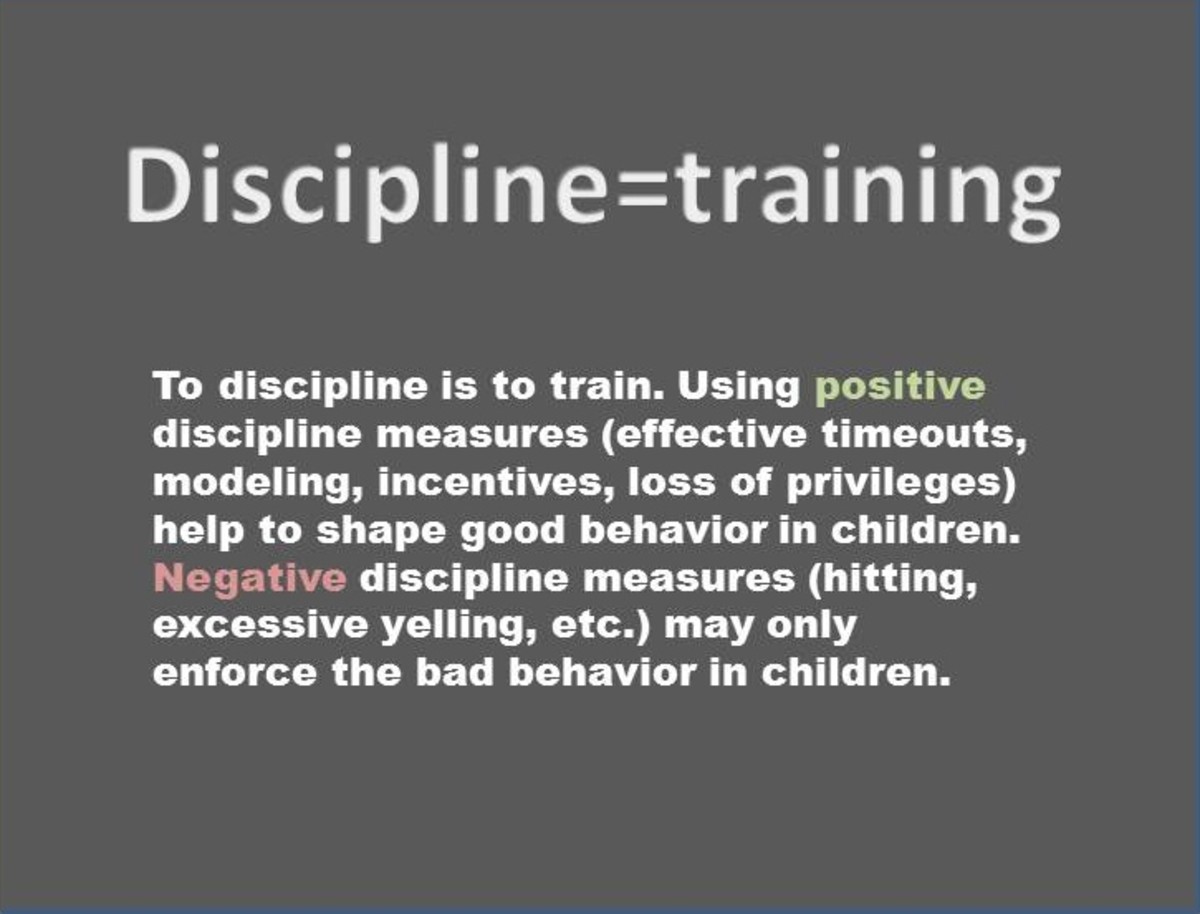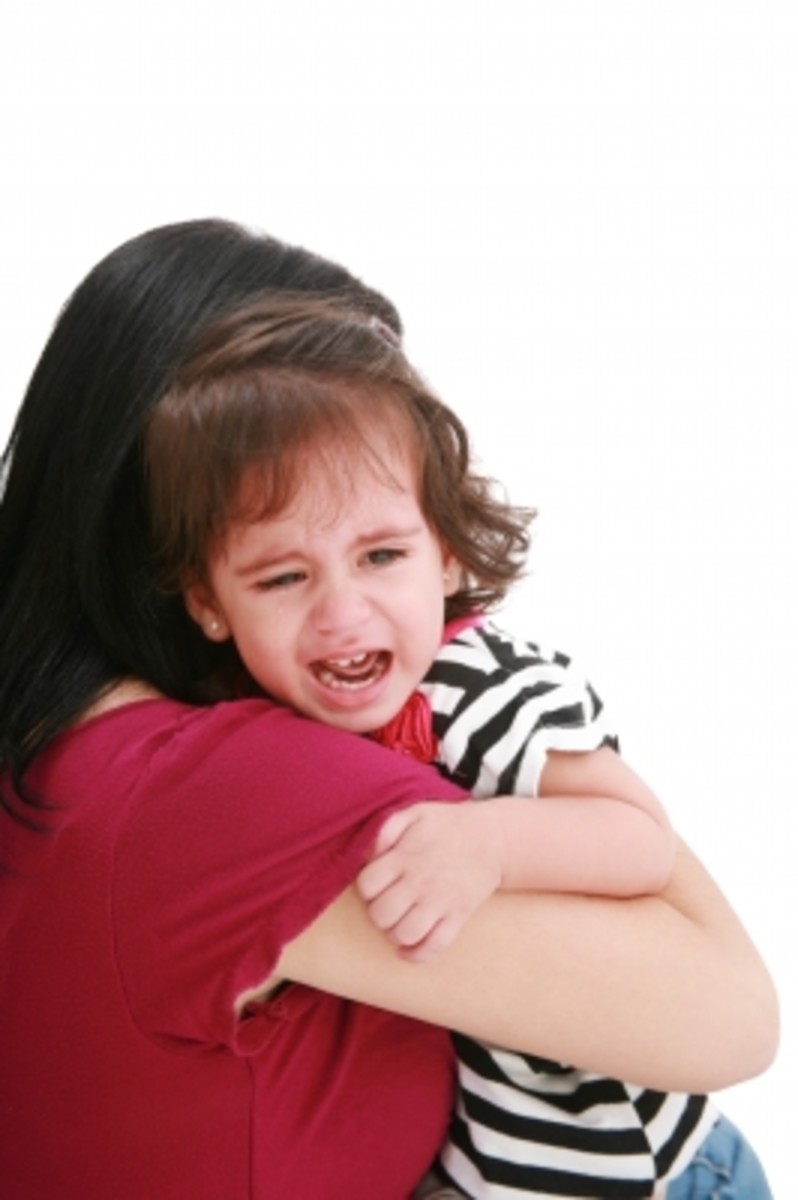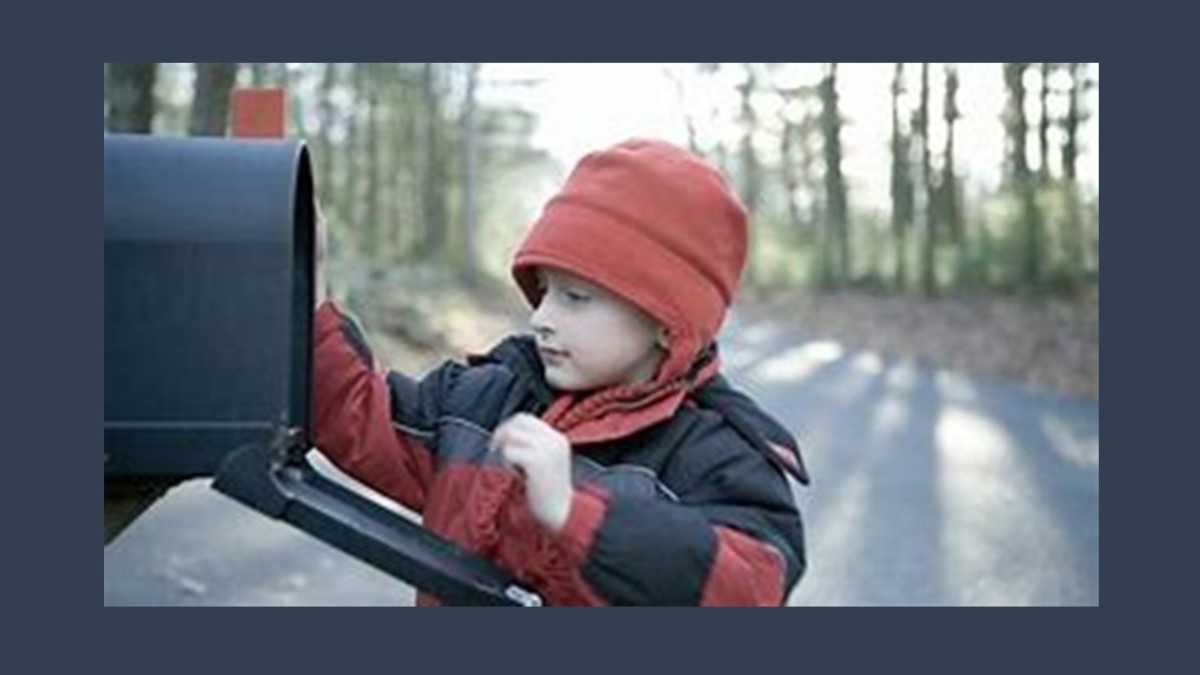Loving our Children

Sometimes Discipline is Love
Children need boundaries. They thrive and grow best when they know the limits and are taught how to develop their own personality within those limits. Somehow a child understands at a very young age that the parent who has set reasonable boundaries is a parent that truly loves. Family rules are a form of protection and caring.Discipline becomes necessary when the boundaries and limitations have been crossed. While often thought of as punishment, true discipline is really a form of education. It's a means to emphasize the importance of the rules. It teaches the need for respect and builds character.This lens is really an "appendix" of sorts to another lens I created to help parents as they raise children to become responsible and respected adults. You can find it here. My prayer is that both will help parents with this most wonderful task, the responsibility of raising healthy and terrific children.

More Help for Moms

Discipline
A True Sign of Love
Let me tell you right off the get go, I am a firm believer in discipline. I DID NOT SAY I was a firm believer in beating your child. There is a difference. Discipline may occasionally mean spanking (striking a child's bottom with your hand), but it truly means so much more!If you love your child you will discipline and never abuse him. As parents our goal should be to help our child reach adulthood with a healthy understanding of right and wrong and respect for themselves and others. This can only be reached through discipline. And discipline must start at birth.
Did I just lose you there? I know that half of you almost just quit reading. You think I'm crazy. You've always thought that true discipline can't begin until the child is at least two or three. That idea, the misconception that kids can't be disciplined until they are at least two is what I believe created the "terrible two's." I have discovered that children who are lovingly disciplined from the moment they are born never really go through the worst parts of those "terrible two's" or threes.We encounter those rough toddler years when, without warning, the rules change. When the little angel goes from total freedom to do whatever he or she pleases to a new set of standards complete with consequences, they will rebel. I'll guarantee it. Many psychologists will tell you these wee ones are beginning to develop independence, and that's what causes the problems. And although I don't have a degree in child psychology, my experience with my own children and being around classrooms full of other kids has given me just a slightly different view.
I have noticed that psychologists are correct. It is about the age of two or three that our wee ones begin to understand they have the potential for independence. They learn quickly to say, "I can do it by myself." The difference I've noted is that those who've been disciplined since they were born also understand that in their independence there is also some respect expected. Don't get me wrong. There will still be a tantrum from time to time, and you may have to occasionally educate them from the bottom up. However, those children who've been given a set of standards they are expected to adhere to since birth exercise their independence better within the guidelines.
By now you're wondering, "How do I discipline a newborn?" To be honest it's very easy and not even necessary all that often. But here are a couple of examples:Your child is screaming at the top of her lungs and has been for hours. You've ruled out a dirty diaper, the need for a bottle and any medical condition that may need attention. No amount of rocking or comforting will stop the screaming. It is OK to take your baby in and lay her in her crib. By doing this you help her understand that crying without cause is unacceptable. That is discipline. She doesn't need spanked or struck. You've already shown her as much love as is possible. You'll check on her while she's in her crib crying. If she's a real screamer, you may have to do this many days, but she will, at some point, figure out that crying won't change her situation to the better.
That's what discipline does. Discipline helps your child understand that unacceptable behavior will not be tolerated and especially will not move them closer toward their desired outcome. Children have the capacity to learn that lesson at a young age. Don't underestimate them. I hear so often, "He's just not old enough to understand." You will be amazed at how young a child can "understand."
- Biblical Discipline
Discipline is a very Biblical context and although it is often associated with punishment, one has nothing to do with the other. Here are a few Biblical ideas to get you started.
Before age three one of my daughters figured out that if she didn't finish dinner, she could make up for it when she had her bedtime snack. We didn't believe in making our children clean their plates. My husband and I both have suffered with weight problems stemming somewhat from the notion that we can't leave any food behind. However, after three or four days of this toddler not finishing her dinner then enjoying a big bowl of ice cream just a few hours later, we decided to help her learn a lesson. When we cleared the table, we saved her plate of food. As we dished the other two girls a bowl of ice cream or popped some popcorn, we warmed her plate in the microwave. While her sisters enjoyed their bedtime snack, this third daughter ate spaghetti or roast beef. It only took two or three evenings and soon she was eating a respectable dinner again.
Does that mean we never spanked the girls? I wish we could affirm that, but truth is we sometimes did have to teach a lesson by the seat of the pants. Let me also emphasize that we will never recommend that a parent strike a child anywhere except the buttocks or a slap on the hand. And as a general rule, I believe these forms of corporal punishment should be administered with the parent's hand rather than a belt, board or other instrument. It's just too easy to become abusive when you use something other than an open hand. By using the palm of your hand, you're more likely to feel a bit of sting also helping to keep you from crossing the line from discipline into abuse.
I don't think we ever spanked our children after they were three or four and not before they were able to crawl. It was only during that two to three year period between about six and 42 months that spankings were sometimes necessary. The first time they played in the toilet, we spanked them. And generally it was the last time they played in the toilet. When one of them repeatedly wanted to knock over the garbage can while in her walker, we smacked her fingers. We aren't fans of the kid leashes so we never used them. But the first time we lost them in clothing at a department store and then explained to their bottom that they had to always hold our hand and stay with us, we seldom had that problem again.
I think corporal punishment works best when it's reserved for very serious offenses (repeated bad behavior or behavior that could injure themselves or others). If we always use spankings as a form a discipline, children will have a much more difficult time sorting out what is totally unacceptable and that which is merely rude or undesirable. Save spankings for a last resort. That way when you must strike your child, he or she will understand that they have crossed the line and this is a serious offense. So, what are some good means of discipline? Scroll down and check them out. I've got a few suggestions below!
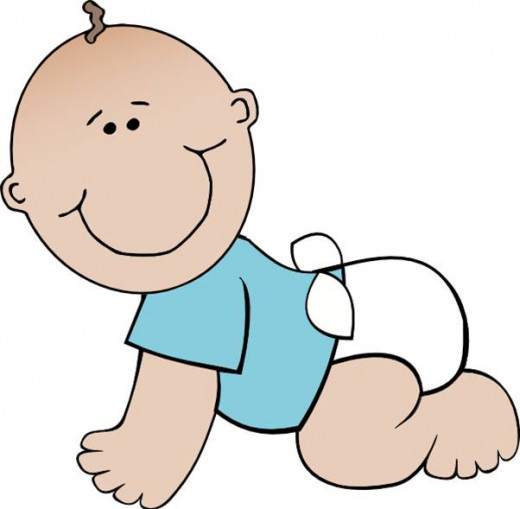
Suggestions for discipline
Just a few that worked for us
Till age 6 months: Generally the only problem we had up till this age was our child not wanting to miss out on anything. Their solution would be to scream to keep themselves awake. You could see them nearly nod off, and then boom, they'd start to cry. That's when we put them in their cribs. Usually they would cry themselves to sleep in just a few minutes.
To be honest this is more "good parenting" than discipline. If a child needs to sleep, but won't fall asleep when you are rocking or comforting them, putting them in bed is acceptable. This is not a solution for a child who is ill, hungry or uncomfortable because of a dirty diaper or rash. Remember that discipline is a "teaching tool" not punishment. We had a daughter who was too stimulated by touch to be rocked to sleep. (It disappointed me, because I LOVED rocking my first child) When she got fussy to the point she couldn't be comforted, putting her to bed was our only option.
Six Months to 18 Months: This is the hardest time because there are only two forms of discipline kids really understand at this point, spanking and moving things out of their reach (which can cause screaming - at which point we would normally resort to putting her in her bed).
18 to 42 Months: You should be able to begin to put a child in bed or send them to their room for discipline at this age. They will often have a hard time sharing or begin to talk back. It's important for you as a parent to understand that neither of these behaviors is acceptable, even if they are younger than 18 months. Discipline is required. If you have a strong willed 12 month old, and they say "no" when you ask them to do something, do yourself a favor, don't laugh. It doesn't matter how cute the "no" is (and sometimes it's adorable because they are so little), laughing will send them the message that their behavior is all right. They will do it again, I promise. Discipline can be as simple as saying sternly, "You can not tell me 'no' when I ask you to do something." As they get older, you can explain that sometimes they may need to say, "Mom, I really don't want to do that," but "NO" is never acceptable. By the time they are four or five they should be able to understand the difference between voicing their opinion, "I'd rather not" and being defiant.
3 years and up: We seldom, if ever, had to spank our kids after this point. By now you can make them sit in a chair by themselves for a while or send them to their room as punishment. If they make a mess, they should at least have to help clean it up. Defiance and disobedience are best conquered by taking away something they enjoy. I don't recommend taking away a comfort toy (one that helps them sleep), that will make you as miserable as it does them. However, a TV show or a toy or the Nintendo DS or Wii make wonderful disciplinary tools for kids age 3-8. Older kids might miss their bike or computer, a friend's house or phone calls. And the oldest ones might have to ride the bus to school instead of being allowed to drive, they might lose cell phone privileges or have to miss a party or special event. We often banned the use of "AOL Instant Messenger" when they had crossed the lines.
We generally avoided punishment that would negatively effect others. For instance, we never grounded them from leaving the house because that meant one of us would have to stay home. And I can't remember ever telling them they had to miss a sporting event or band performance. We agreed that they were a part of a team, and it wasn't fair to the rest of the team to keep them away. I suppose if there had been no other way to get the message across that their behavior was unacceptable, we may have used those kinds of bans. But we never encountered behavior that required such drastic measures, partially, I believe, because by the time they were involved in these team sports, they had learned enough about respect that they didn't require a lot of discipline.
And here are some creative forms of discipline we used:
For Lying: One of our girls developed a terrible lying habit. She would lie about the silliest things, things that didn't even matter. Finally, when she was about 11, I'd had it. We'd tried everything to help her learn it was unacceptable. I took out my husband's concordance (that's a book with a reference to every word in the Bible). I made her look up and copy 10 verses in the Bible that used the word lie and 10 that used the word truth. I told her that every time she lied she'd have to do that, and I didn't care if she had to write the whole concordance. (this book is about 6 inches thick - it's HUGE). That pretty much cured her.
For never putting clothes away: We had a little problem with a couple of the girls changing their minds about what to wear. They must have been about age six and eight. Every outfit they'd try on would be on the floor, and when I asked them to clean their rooms, they'd put the clothes in the hamper to be washed. They were convinced of the folly of their ways when I began going through the laundry on wash day and putting back in their drawer every item that had not been worn since the last time I washed it. Unfortunately for them the clothes often had the smell of the laundry hamper. It only took a couple of times doing this to help them understand it wasn't respectful to make extra work for others.
For not coming home on time: Generally we'd warn them a couple of times, then if that didn't work we'd let them come in late without saying a word. I think they thought they got away with it. Until the next time they made plans. We'd let them work out all the plans, then when they came to us to ask permission, we'd remind them that they didn't know how to come in on time so they wouldn't be allowed to go out this time. It was much more effective and made a much more lasting impression than grounding them when they came in late.
Those are just a few that worked for us. Don't hesitate to be creative and work with your child's personality to help him understand the merits of respect and love as well as the consequences of selfishness and disobedience. Discipline will not hurt your child. In fact, it has the potential to mold them into a remarkable adult. Use it wisely, with respect and understanding. It is a powerful tool when executed properly. And remember, discipline without respect, caring, love and understanding is called abuse.
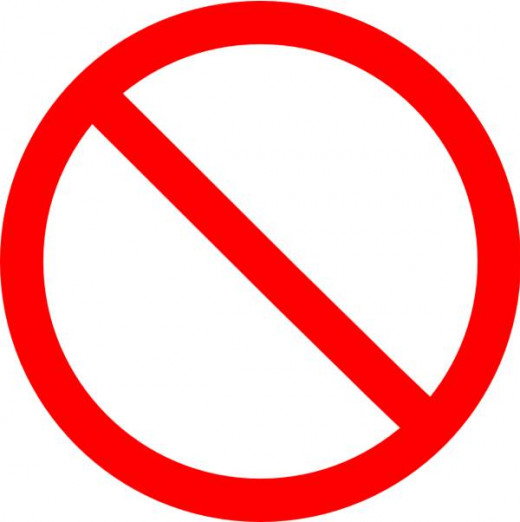
Never Mistake Abuse for Discipline
It's not the same thing
Ask yourself these questions.
1. Do I strike my kids more than once a week?
2. Do I hit my kids anyplace other than their bottom?
3. Do I ever strike my child who is older than 10?
4. Do I raise my voice for more than one word to get their attention?
5. Do I ever use the words dumb, stupid, idiot, etc?
6. Do I ever use foul language (words that would get a movie a PG-13 or higher rating)?
7. Do I get angry at my children more than once a day?
If you answer YES to even ONE of those questions, find a counselor, go to a Celebrate Recovery Group near you or enroll in some sort of anger management classes. Just because your parents used excessive force and you "survived," it's no excuse to abuse your child. Any kind of physical punishment should be reserved as a last resort.
Excessive yelling is also a form of abuse. Even if you never touch your child physically, if you always raise your voice when they need corrected, you need help. You will occasionally need to yell, especially to get their attention, but for the most part, children will respond positively with a firm but calm voice. Don't be afraid to admit you need counseling if you can't get it under control within a month or so.
If you ever, and I mean ever, use the words dumb, stupid, idiot, moron or the like when speaking to your children, you are abusive. Those words are never, let me repeat that, those words are NEVER appropriate when you are disciplining. Chairs are stupid because they have no brain. Children are not stupid. If you can not stop using those negative terms, seek professional help immediately. In fact, if you ever speak negatively in a non-constructive manner to your child (or others), it's time for you to respect yourself enough to get a counselor.
If you love your child, you have the potential to be a great parent. True love is the cornerstone to raising children. Just remember that selfishness and acting out are not signs of love. Examining your life to make sure none of these descriptions fit you is an act of love. Admitting you have a problem is an act of love. Entering a 12 step program or finding a professional counselor is an act of love.
So go ahead . . . love your child!
The Five Love Languages of Children - One of my favorite parenting resources
I didn't read this book until my children were all grown; however, I believe that the principles found within could change the life of many children as well as their parents. (And the partner books for couples, teens and Christians are also all wonderful, I've read them all!)

What a kid thinks about discipline
In the eyes of a 10 year old
When my youngest was in her pre-teen years, we were out shopping one day. While at the grocery store check-out, we noticed an older lady with a young boy who looked to be about three. We assumed she was his grandmother. The boy was in the buggy basket, and he'd obviously not gotten something he wanted because he was kicking his grandmother. Nothing she would do could make him stop kicking. She was trying hard to keep from making a scene, but this boy's tantrum was drawing attention.
My daughter said nothing as we stood in line, but walking to the car through the parking lot, she asked, "Did I ever act that way?" I laughed and told her that she never acted like that with her grandmother. I jokingly said that if she had we'd have killed her. She said, very seriously, "I'm really glad you made me behave when I was little. I would be so embarrassed to think I ever treated Grandma like that."
I really believe children want to learn how to act appropriately. They want people to like them. As parents, we love them no matter how they act, but others don't. So, go ahead and love your children. Love them enough to help them become the kind of people that others can love too!
More Pages to Help Parents
- Devotions for Busy Moms
Every Mom needs some time to relax and enjoy Christ. These short readings are designed to help a mom do just that! - How To Be a Great Parent
So, you want some ideas on how to raise children. You're looking for parenting ideas, and you're wise enough to know that learning from others' mistakes and experience is the best school. If that describes you, you're in the right place.


